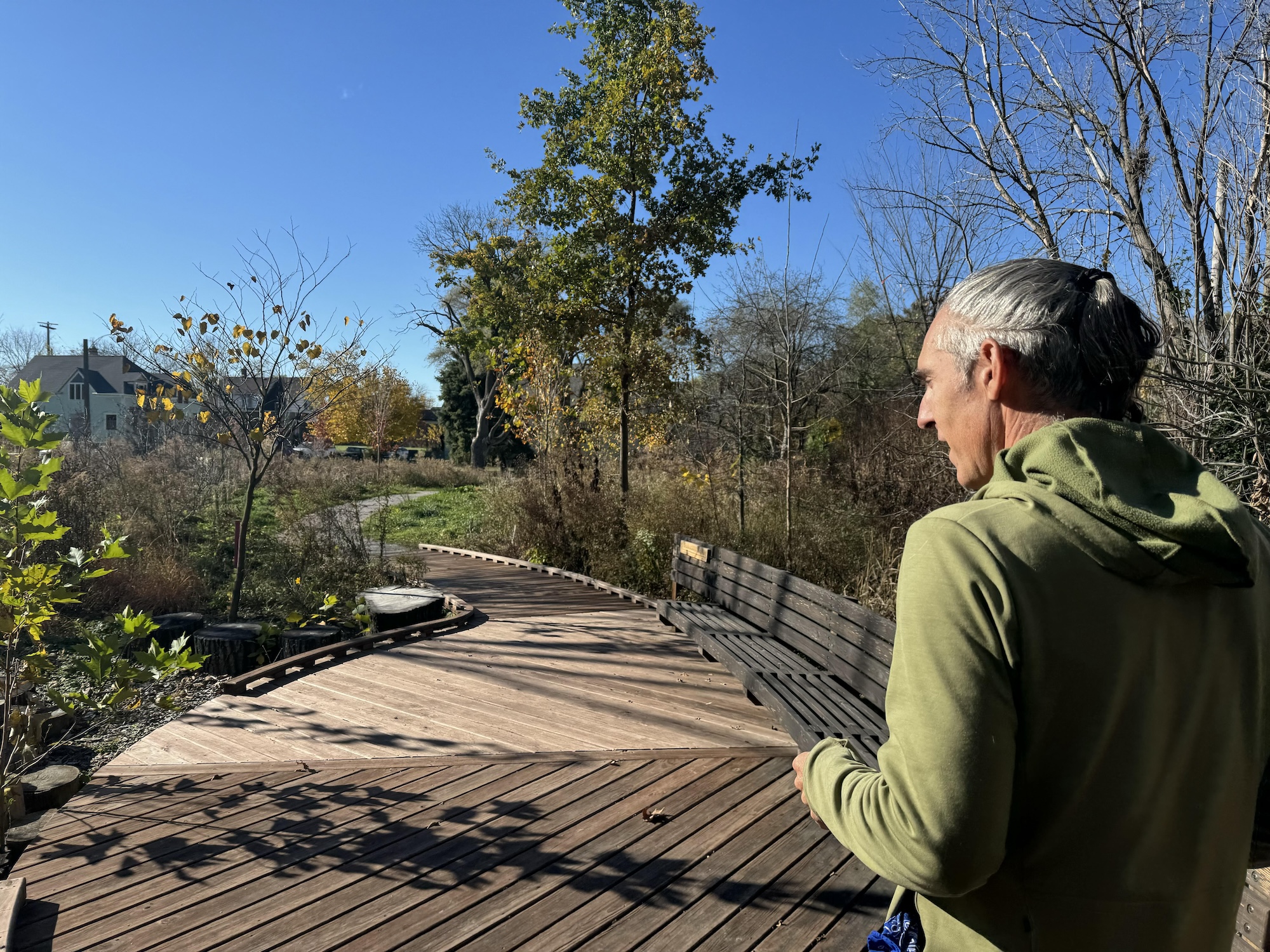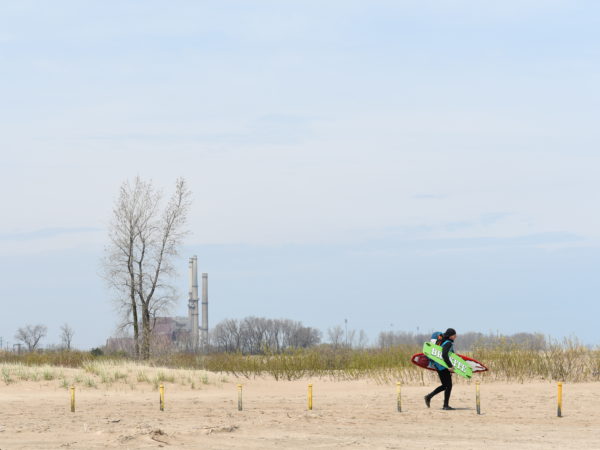
By Ethan Bakuli, Planet Detroit
This article was republished with permission from Planet Detroit. Sign up for Planet Detroit’s weekly newsletter here.
On any given morning, Marcel Wyckoff wakes up in Poletown East to a chorus of birds chirping in the forest outside his window.
It’s an oddity, says the 29-year-old Detroiter, who grew up living in heavily residential areas on the city’s east and west sides, distant from much green space or wildlife. But since moving to Detroit’s Poletown East neighborhood this past year, Wyckoff says he’s enjoyed the tranquility of living in this part of the city.
“It’s a peaceful place for me,” he said. “This is a part of my backyard.”
Circle Forest, a tree park that rests behind Wyckoff’s house, is a recent addition to a patchwork of vacant neighborhood land repurposed into green spaces on the city’s east side.
Unveiled to the public last month, Circle Forest has been years in the making: an urban reforestation project that aims to encourage city dwellers to sit still, watch birds, or gather with others in nature.
At a ribbon-cutting ceremony held in October to celebrate the opening of Circle Forest, Poletown East resident Andrew “Birch” Kemp, co-founder and president of the nonprofit Arboretum Detroit, spoke about the project’s significance to his neighborhood.
“This was a place that didn’t exist three years ago and is now so central to our neighborhood that I wouldn’t want to live here without it,” he said.
“It’s always been just about trees”
Poletown East, which has suffered from pollution from industrial facilities in the area, has undergone a transformation as residents have reimagined the neighborhood as a haven for land stewards and urban farmers.
Tree planting has been a lifelong effort for Kemp, a born-and-raised Detroiter who’s lived in Poletown East for over two decades. He previously worked as an English teacher in the Detroit Public Schools Community District, encouraging a love of nature amongst his students during and between classroom lessons.
“It’s always been just about trees, whatever way to get the most trees,” Kemp told Planet Detroit in late October.
In 2019, Kemp pivoted from teaching full-time to launch Arboretum Detroit alongside his wife.
“Something clicked where it was like if we had the nonprofit, we could make public space, we could protect the land, we could plant trees that will be safe from development and create something beautiful for the neighborhood,” he said.
In 2021, the non-profit broke ground on Circle Forest, partnering with Detroit Future City. Through collaboration with neighborhood residents and local volunteers, Arboretum cleared away roughly 60 yards of garbage and has planted over 200 trees and 90 different species of wildflowers and shrubs.
Circle Forest’s restoration was funded by a $260,000 grant from the National Fish and Wildlife Foundation’s Southeast Michigan Resilience Fund and additional financial support from General Motors and AARP.
“This is about creating green and sustainable neighborhoods,” said Kate Cherry, director of development at Detroit Future City, a nonprofit that offered support for the reforestation project. The think tank first collaborated with Arboretum to develop a tree nursery in Poletown East and has been working with the city of Detroit to advance green land use projects.
“We really try to see vacant space as a community space, where for so many years people said vacancy comes with blight,” Cherry said. “When you have someone in the neighborhood stewarding land, taking care of a site, they don’t always have a robust organization behind them, so the sustainability of that work can come into jeopardy as they get older or their resources change or things change around them.”
From a “stump scape” of woody debris and makeshift play mounds to ADA-accessible pathways and a miniature trail for forest critters, Kemp and his neighbors see Circle Forest as a vital gathering space for the neighborhood and a vegetative buffer from surrounding pollutants. The nonprofit has already hosted bonfires, school field trips, yoga sessions, and bird-watching tours, with plans for future programming.
‘Cool as hell’
“I have a five-year-old and three-year-old, and there are some stretches of weeks in the summer and fall where we go there every day,” said Poletown East resident April Worden. “Once we get there, I can just let my kids play and run around in circles in the forest.”
Like other neighbors, Worden was attracted to the neighborhood because of its recent history of community-led land stewardship. She grew up in Southwest Michigan on a dairy farm and prior to moving to Detroit, dreamed of “having animals in the city for the children of Detroit to be able to experience nature.”
When Wyckoff bought his house from the Detroit Land Bank Authority six years ago, there was nothing but trash occupying the land where Circle Forest now sits. Seeing the evolution of space, he said, has been “cool as hell.”
“I talk to Birch often now about turning my trees into benches, having a pond in the backyard, growing a garden, learning about trees and how they communicate with each other and not raking the leaves on my lawn,” he said. “It’s definitely encouraged me to get outside.”
Kemp has been encouraged by how others have used the forest, from schoolchildren and dog walkers to Detroiters passing through neighborhood trails on their way to the nearby liquor store. He hopes the space invites more citywide conversations about turning privately owned land into public spaces.
“If I can create spaces where people can come and fall in love with trees and not worry about them…that’s great,” he said. “If it’s somebody who wants to plant a tree, if it’s someone who just wants to sit on a rock and take a moment of stress relief and healing, if it’s somebody who comes to our fire pit for a forest jam, there’s all that available.”
Catch more news at Great Lakes Now:
Federal aid to rescue Michigan cherry farmers after devastating crop loss
Who is working to preserve and restore wetlands in Metro Detroit?
Featured image: Detroit’s Poletown East neighborhood is seeing change with the opening of Circle Forest, a tree park by the nonprofit Arboretum Detroit. Funded by a $260,000 grant, this project aims to provide a green space for residents and visitors, offering a peaceful escape from the city’s hustle. Andrew “Birch” Kemp. (Photo by Ethan Bakuli)




